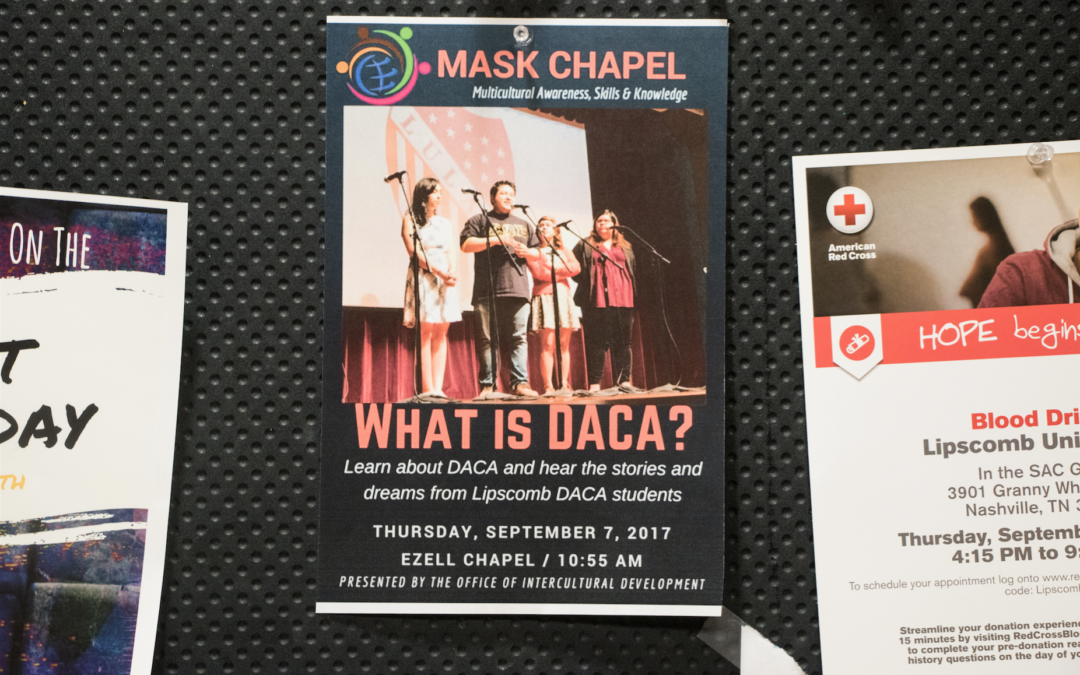In response to President Trump’s announced plan to phase out the Deferred Action for Childhood Arrivals (DACA), Lipscomb University’s Office of Intercultural Development believed it necessary to confront the controversy.
In Thursday’s Multicultural Awareness, Skills and Knowledge, or MASK, chapel, Assistant Dean of Intercultural Development, Lisa Steele, addressed the overwhelming audience in Ezell Chapel.
“DREAMers,” she said, referring to the student-recipients of DACA, “are just like you. They’re fellow human beings.”
She went on to explain what DACA is and some of its limitations.
DACA is an immigration policy brought forth by the Obama administration that grants children of undocumented immigrants the opportunity to pursue an education, free from the fear of deportation. It grants recipients protection, temporary licenses and social security cards so that the students can drive and hold down jobs.
“They still have to pay taxes,” Steele said, confronting a common misconception.
“Many people ask, ‘Why don’t they just apply for citizenship,'” Steele said. “They would love to, but there is no path to get there through DACA.”
There are currently 800,000 DREAMers in the United States. Steele passed the microphone to some DREAMers enrolled at Lipscomb University in hopes that hearing their stories would help the campus sympathize.
“When you put a face to a story,” she said, “it changes everything. DREAMers are some of the bravest and most courageous students I know.”
One such student is Juan Gonzalez. Gonzalez is currently enrolled in his fifth year at Lipscomb University. He graduated in May with an undergrad degree in Law, Justice and Society. He runs on the track and cross country team, which provides some of the scholarship that allows him to attend the University.
“I really liked the idea of coming to a Christian environment. That and the scholarship Lipscomb offered me helped me make the decision to come here,” Gonzalez said.
Before moving to Nashville, Gonzalez lived in Orange County, California with his parents and two younger sisters. His two sisters, ages 13 and 10, were born in the United States, making them citizens. Gonzalez and his parents are from Mexico City, Mexico.
Gonzalez’s father made the decision to migrate to the States when Juan was five because of Mexico’s corrupt government, crime and unemployment rate.
“He hoped I would soon follow and become someone in life,” Gonzalez said.
Legal immigration was certainly a consideration, but Gonzalez said it is more difficult than many think. Not only does it cost a lot of money, but it’s also an incredibly lengthy process. Even then, at the end of the day much of it comes down to chance.
Applying for DACA is still difficult, but not nearly as difficult as applying for citizenship.
“It’s not handed to everyone,” Gonzalez said. “It’s a process, and it’s not free.”
He had to pay a fee and undergo a background check before his applications were approved and the government sent him forms.
Regardless of if a DACA applicant is approved, he must still pay a large application fee. Gonzales did not hear of his acceptance until around six weeks after he sent in his application.
“You’re basically in limbo the entire time,” he said.
Through DACA, Gonzalez is able to pursue his dreams of healing the American justice system. He seeks to form a bridge between juveniles who are deemed delinquents and the justice department. Currently, he says, there is a hateful and fearful concept of the justice system.
Gonzalez hopes to start a government-funded organization that creates a purpose and sense of community and healing for juveniles who are facing trouble with the law.
If Congress rescinds DACA, Gonzalez hopes to land a steady job; however, without DACA, when his and other DREAMers’ status expires after a maximum of two years after acceptance, they run the risk of being deported if found stateside.
If Gonzalez and his parents are deported, they will leave his two sisters alone in the hands of the government.
The most obvious thing allies can do, according to Gonzales, is raise awareness.
“Contact our senators and representatives,” he said. “Raise their awareness.”
He suggests also donating to organizations that help immigrant families and raise awareness in a powerful way.
To fellow DREAMers and families, Gonzales says, “Stay strong. We are qualified to be in this country. We are human beings.”

